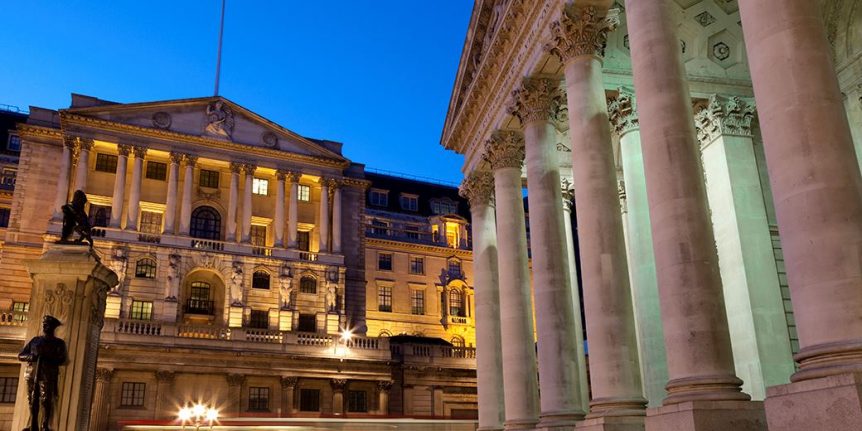Two members preferred to maintain Bank Rate at 4.5%, with no-one choosing to increase by 0.25%.
The Bank of England’s Monetary Policy Committee has voted 7-2 to increase Bank Rate by 0.5% to 5.00% – the 13th consecutive rise.
Many industry experts had predicted a 0.5% rise after inflation held steady at 8.7% yesterday, higher than predicted, although other commentators had expected a smaller 0.25% increase.
Two members preferred to maintain Bank Rate at 4.5%, with no-one choosing to increase by 0.25%.
At the time of the previous MPC meeting in May, Bank Rate was predicted to average just over 4% over the next three years. Since then, gilt yields have risen materially, with the MPC now predicting a path for Bank Rate that averages around 5.5%.
In its minutes, the MPC said: “There has been significant upside news in recent data that indicates more persistence in the inflation process, against the background of a tight labour market and continued resilience in demand.”
However, the Committee still predicts that CPI inflation will fall significantly further during the course of the year, largely reflecting developments in energy prices.
Despite this, it has not ruled out further tightening in monetary policy.
The Committee said it is “continuing to monitor closely the impact of the significant increases in Bank Rate so far”, stating that a high share of fixed rate mortgages means that “the full impact of the increase in Bank Rate to date will not be felt for some time”.
Data from UK Finance shows that a 0.50% increase to interest rates will add £47.43 to the monthly payments for someone on a tracker mortgage and £30.28 to the average SVR.
There are around 800,000 fixed-rate mortgage deals ending in the second half of 2023 and around 1.6 million deals are due to end in 2024.
Adam Ruddle, chief investment officer at LV=, commented: “The Bank of England’s decision to raise interest rates by half a percentage point is a clear sign that the inflation beast is going to be harder to tame in the UK. The market was expecting a quarter point rise given the Bank’s forward guidance but clearly a larger increase is warranted given the stubborn inflation data – particularly core inflation which has reached a 20-year high. A larger than expected increase now should give the Bank some flexibility in the months to come.
“The danger (and increasingly the intention) is that a such a large increase in interest rates will hurt the UK economy, increase mortgage payments and squeeze living standards further. Continuing to increase interest rates is a clear signal that a recession is required to vanquish inflation. I believe the Bank is more likely to revert to smaller quarter point hikes over the next few months. At this point, the data does not suggest there will be any rate cuts over the next 18 months which leaves the UK as an outlier compared to the US and Europe where rate cuts are expected as their inflation is more under control.”
Richard Carter, head of fixed interest research at Quilter Cheviot, said: “Following yesterday’s shock inflation reading, it has clearly spooked the Bank of England into taking more drastic action than predicted with a 50bps increase in interest rates. Until inflation begins coming down to more palatable levels the Bank of England will continue to put the brakes on the economy and as such the UK once again finds itself staring down the barrel of interest rate rises and economic strife.
“It is perhaps becoming clearer that due to the UK’s more unique set of economic circumstances, recession may be the only option to bring inflation down. While the UK avoided recession at the turn of the year, it does not mean one is not lurking further down the tracks. Clearly interest rates are a blunt tool and are failing to have the desired effect in dampening demand but the BoE will keep using them. The problem the BoE faces is much of this inflation has been driven on the supply side so it is not clear exactly what else the Bank of England can do. We are ultimately stuck in a sort of holding pattern waiting for the data to improve.
“Ultimately, this journey to more normal monetary conditions is going to take much longer than planned and this will unfortunately have consequences for the likes of mortgage holders. Subsequent rate rises are going to stoke these fears further and talk of recession is likely to start honing back into view later on this year.”
Simon Webb, managing director of capital markets and finance at LiveMore, added: “The Bank of England’s Monetary Policy Committee has been spooked by the unexpected inflation figures yesterday showing stalemate in consumer price inflation and a rise in core inflation. We are still waiting for the previous base rate rises to filter through to the inflation figures, but the impact is slow and laborious.
“During the 13 years of low interest rates we had become used to, the Bank said that when rates do rise it will be a slow process, but the opposite has happened. The unprecedented 13th consecutive rise in the base rate in 18 months, with further rises anticipated, is a price Chancellor Jeremy Hunt is willing to pay as bringing down inflation is the government’s ultimate goal.
“This latest rise is likely to be reflected in swap rates, which have almost doubled in the past year and therefore fixed rate mortgages will continue to be more expensive.”
Rozi Jones (Financial Reporter)

